The M23 rebel group is tightening its grip on eastern Democratic Republic of Congo (DRC), establishing administrative, financial, and security structures even as a peace deal remains stalled.
In areas under its control, M23 has recruited officials, collected taxes, and trained judges, police, and soldiers, creating a parallel government that rivals Kinshasa’s authority. The region, rich in minerals and bordering Rwanda, has endured more than three decades of conflict, now intensified by M23’s resurgence since 2021.
Earlier this year, the group seized Goma and Bukavu, extending control over vast territories in urgent need of reconstruction and basic governance. With government banks and public offices shuttered, civil servants have fled, leaving M23 to fill the administrative vacuum.
Corneille Nangaa, head of M23’s political wing, said the movement seeks to “build a model of transparent and efficient governance.” Analysts, however, suggest the group is also working to legitimize its rule before the Congolese public and international observers.
In recent months, M23 has appointed provincial governors, mayors, and local administrators, while issuing identity cards and official documents for residents. Yet despite these measures, Goma and Bukavu lack functional courts and police, with locals reporting rising crime and worsening economic hardship.
Since August, M23 has showcased a newly formed police force—partly composed of former government officers—conducting public riot control drills and crime investigations. It has also launched an exam to recruit over 500 lawyers into a new judiciary system, despite UN reports accusing the group of arbitrary detentions and punishments.
The militia has reportedly recruited around 7,000 fighters, many drawn from former army ranks, to defend its territories and combat pro-government militias.
With state banks closed, M23 has introduced a financial authority and begun taxing trade and mining activities, a move that has drawn sharp criticism from civil society groups and trade unions. Locals say the new levies are worsening the economic strain caused by ongoing conflict, inflation, and frozen savings.
As peace negotiations drag on, M23’s growing administrative control underscores the deepening fragmentation of the Congolese state—and the mounting challenge of restoring government authority in the country’s volatile east.
Source:Africa Publicity








